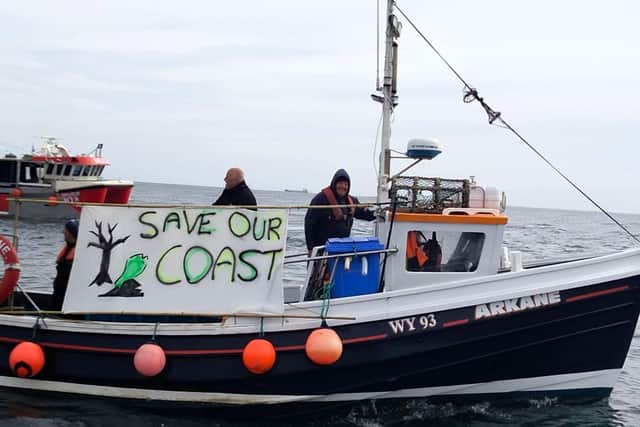'We demand that future dredging operations be halted' - Whitby fishermen react to new study on crab deaths
and live on Freeview channel 276
The investigation, commissioned by the North East Fishing Collective (NEFC), was looking experimentally at the impact of pyridine on crabs, which could have been released by dredging, saying it was the most likely killer of the crustaceans.
The study conducted by Newcastle, Durham, York and Hull universities said the chemical can induce the same twitching behaviour as seen in affected Teesside crabs, being found in both near-shore and offshore sediments.
Advertisement
Hide AdAdvertisement
Hide AdIt also found that computer simulations could predict that plumes of any toxin could rise up from the seabed after storms or dredging.


The findings oppose DEFRA’s claim that the shellfish deaths which have ravaged the fishing community were down to harmful algae bloom.
Fishing businesses and livelihoods around the Whitby coastline, from Teesside down to Scarborough, have been severely impacted, with the amount of crab on traditional fishing grounds decimated.
James Cole, Chairman of Whitby Commercial Fishing Association, said: “We demand that future dredging operations be halted until proven beyond doubt that no harmful pollutants will enter our environment and fishing grounds.
Advertisement
Hide AdAdvertisement
Hide Ad"We are not against regeneration, we just want to our environment and livelihoods safeguarding. ”
Marine biologist Joe Redfern, who runs Whitby’s lobster hatchery on Pier Road, hoped the evidence would be well received by DEFRA and that moving forward, they would ensure the marine environment was protected from harmful chemicals.
“The conclusions from the universities are clear,” he said.
"They demonstrate that pyridine is present in our marine environments and that dredging had the potential to disperse the toxic chemical across the entire impacted area.
"Furthermore, the toxicity analysis shows just how harmful pyridine is to crabs.
Advertisement
Hide AdAdvertisement
Hide Ad"It would be irresponsible to discount these findings and allow destructive dredging and sediment dumping to continue out of the Tees.”
The NEFC members said in a joint comment, that loss of earnings had resulted in fishermen being put out of business indefinitely with multiple boats being put up for sale in the past few months.